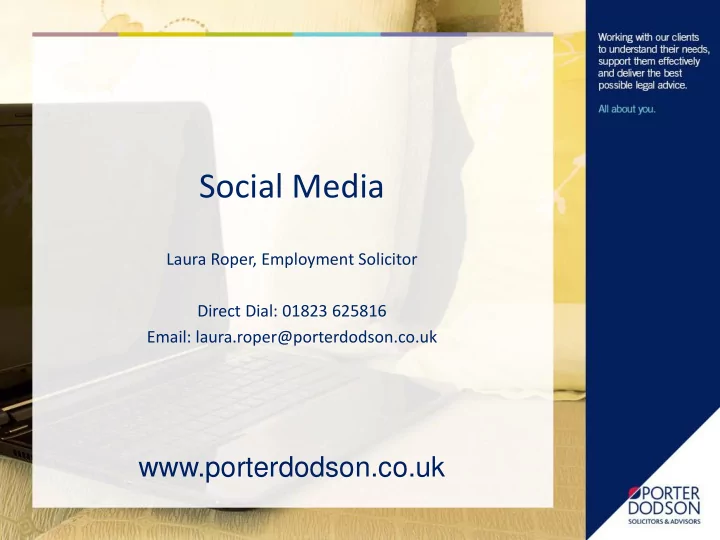

Social Media Laura Roper, Employment Solicitor Direct Dial: 01823 625816 Email: laura.roper@porterdodson.co.uk www.porterdodson.co.uk
Where does an employee’s duty to his employer end and his right to a private life begin? What practical steps can be taken to minimise the risks and increase the employer’s options?
Introduction Trades Unions Congress described Facebook’s 3.5 millions users (at the time) as “ HR accidents waiting to happen”. W here does an employee’s obligations towards an employer end and his private life begin? Can be difficult to draw a distinction…
What is Social Media?
Employer Issue 1 Unacceptable postings on social media Public posting vs Private posting? Gosden v Lifeline Project Limited [2009] - “it is your duty to pass this on”. - espoused racist and sexist views. - close connection to the individuals referred to in the email. What if there is less of a connection between employee’s job and the inappropriate posting? Best approach: Have a social media policy which clearly sets out the standards expected from employees when using social media.
Employer Issue 2 Prospective Audience Preece v JD Wetherspoons plc [2010] – not a private post Taylor v Somerfield (unreported) – no clear association Size of the audience is directly relevant unless conduct is so serious. Best approach: All employees should assume that anything they say on social media is potentially public in nature and employers should warn of this in a social media policy.
Employer Issue 3 Criticising the Employer Damage to reputation or comments bringing the employer into disrepute must be “ more than merely fanciful ”. Taylor v Somerfield (unreported) – only 8 people viewed the video Breach of implied duty of mutual trust and confidence - Employee must be sufficiently senior. Best approach: Have a social media policy which makes it clear to employees how seriously the employer treats its reputation and addresses the disciplinary consequences of publishing negative comments online.
Employer Issue 4 Online Bullying and Harassment Vicarious Liability – “ acts done in the course of employment ” Chief Constable of Lincolnshire Police v Stubbs [1991] after work drinks and leaving party in a pub = in the course of employment. Sidhu v Aerospace Composite Technology Ltd – family fun- day with family and friends, arranged by employer = not in the course of employment. Best approach: Have a bullying and harassment policy as well as a social media policy.
Social Media Policy 1 What is the best way to deal with the challenges of social media? Have an up to date and comprehensive social media policy. - Educate employees. - Set down own rules for social media use. - Provide the employer with a right to discipline employees. - Reduce the chance of Employment Tribunal claims. - Increase the employers chances of success.
Social Media Policy 2 What to include in a social media policy: - A warning that posts on social media should be treated as public, not private. - Restrictions on references to the employer’s name. - Prohibition of bullying and harassment, online or otherwise. (Also consider a separate bullying and harassment policy). - Prohibition of posting derogatory comments about the employer, colleagues, clients or other third parties. - A warning that a breach of the social media policy is likely to lead to disciplinary action up to and including dismissal.
Questions? @porter_dodson www.porterdodson.co.uk The information provided in this presentation is for general guidance purposes only and does not constitute legal advice or purport to be an exhaustive statement of the law, the application of which will vary from case to case. It is intended solely to bring to your attention various issues and legislation, and you should therefore take your own legal advice as to how they may apply to your specific case. Porter Dodson cannot be held responsible for any losses arising from failure to take such advice. ‘Porter Dodson’, ‘Porter Dodson Solicitors & Advisors’ and ‘Porter Dodson Fertility & Parenting Law’ are trading names of Porter Dodson LLP, a limited liability partnership registered in England and Wales, with registered no. OC372439. Porter Dodson LLP is authorised and regulated by the Solicitors Regulation Authority.
Recommend
More recommend